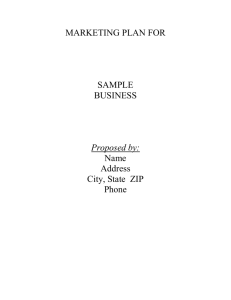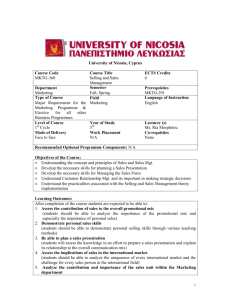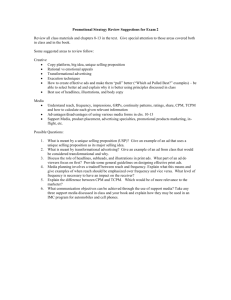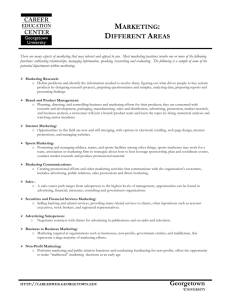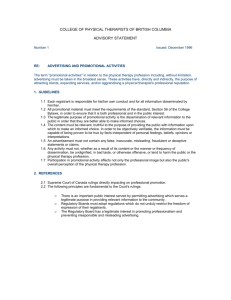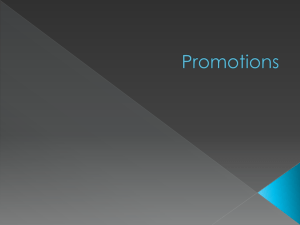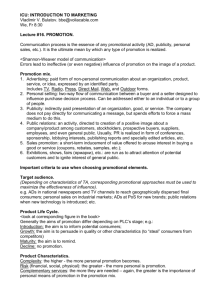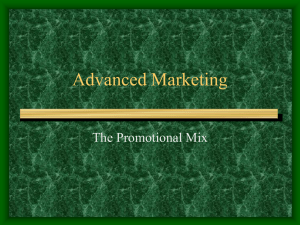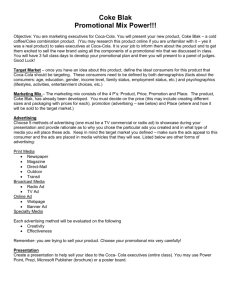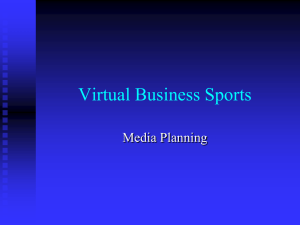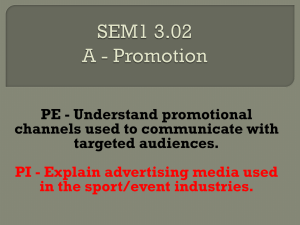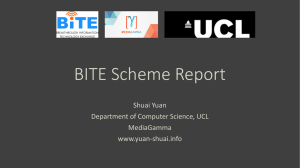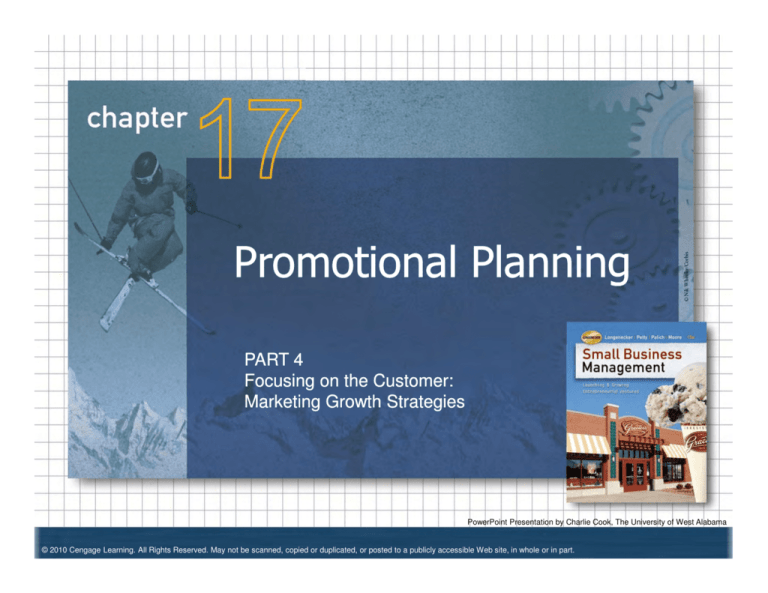
Promotional Planning
PART 4
Focusing on the Customer:
Marketing Growth Strategies
PowerPoint Presentation by Charlie Cook, The University of West Alabama
© 2010 Cengage Learning. All Rights Reserved. May not be scanned, copied or duplicated, or posted to a publicly accessible Web site, in whole or in part.
Promotional Mix
A blend of nonpersonal, personal, and special
forms for communication techniques aimed at a
target market over time
• Makeup of the mix is determined by:
Geographical nature of target market
Size of promotional budget
Product characteristics
17–6
Promotional Messages
Put the “right message”, in front of the “right person” at the “right time”
2 Types of messages (simplified)
“We Exist” (give them a “WHY”) or “Buy Now” (give them a “NOW”)
TASK
TIMING
FREQUENCY MESSAGE
$ COST
INC.
Magazine
Spring
Monthly –
2 months
“We Exist”
2,500/mth
LA Times
Summer
Weekly
(Friday 4
weeks)
“Buy Now”
Summer Promo
1,200/week
Content
marketing
(social media,
Blogs)
Year
round
Four times a
week
“We Exist” AND
“Buy Now”
(promo items)
1,500/week
Etc.
17–8
Gantt Chart for Promotion
Content Marketing
Shows time layout with tasks listed helpful to determine coverage over time and
consistency of message
Download from my web page (in MS Excel) – Go to “Entrepreneurship Resources”
http://instruction2.mtsac.edu/rjagodka/Spreadsheets/free-gantt-chart-template.xls
17–10
Gantt Chart – Visually Shift
Before analysis: Go FROM:
Content Marketing
After analysis: Change TO:
Content Marketing
17–11
Exhibit 17.2 Four-Step Method for Determining a Promotional Budget
17–13
Comparing Alternative Promotion Expense Estimates
START
Compute WTDJ
Proceed to
develop
promotion at
WTDJ level
YES
Is WTDJ equal to
or less than others?
Key Terms:
WTDJ: What it will take to do the job
APS: A percentage of sales
WCS: What can be spared
ACS: As much as the competition spends
NO
Compute average of
WTDJ, APS, WCS, and ACS
Compare WCS with
computed average
Proceed to
develop
promotion at
average level
YES
Is WCS equal to or
greater than average?
NO
Seek additional
funds to
supplement
promotion
17–14
Compensation for Salespeople
• Nonfinancial Rewards
Personal recognition of employees by the firm
Plaques and “Employee of the Month” awards
Providing “perks” to superior performers.
Personal satisfaction drawn
by salespersons from doing
their work well.
17–24
Compensating Salespeople
• Commissions
Compensation paid as percentage of
sales productivity.
Strong sales motivator
• Straight salary
Compensation paid regardless of
sales made.
• Combination of commissions and salary
Balance of two compensation forms is adjusted to
provide an increasing proportion of commission as
salesperson gains experience.
- Most attractive for new salesperson
17–25
“Advertising That Works”
1. How to Promote a restaurant in tough times?
Short FILM
2. How to Get Customers With NO Ads? FILM
2. Promote your focus
3. FREE stuff
Do you EXPECT free food at Costco?
Magnets on refrigerator, T-shirts
17–26
Creative Advertising - BAGS
Creative Advertising
17–34
Creative Advertising
17–36
Creative Advertising
17–37
Old Ads The DON’T Work
Old Ads The DON’T Work
Old Ads The DON’T Work
Sales Promotion Tools
• Trade Show Exhibits
Provide hands-on experience with products at
less cost than personal selling.
• Making Trade Show Exhibits Effective
Check out the trade show’s history.
Prepare a professional-looking display.
Have a sufficient quantity of literature on hand.
Make sure you have a good product.
Do pre-show promotion.
Have a giveaway or gimmick.
Train booth personnel.
Follow up!
Freebies
17–52
17–56
Small Businesses as Global Enterprises
• Globalization
The expansion of international business:
Converging
market preferences
Falling trade barriers
Integration of national economies.
• Born-global Firms
Small companies launched with
cross-border business activities
in mind
• Size does not necessarily limit a firm’s international
activity,
17–57
17-4
Strategy Options for Global Enterprises
17–59
Film: Expanding Internationally (20 min)
Open a McDonald’s in Russia
Answer these questions while watching:
1. What challenges did they face?
2. What were the keys to success?
3. What is your “take-away”?
17–60

